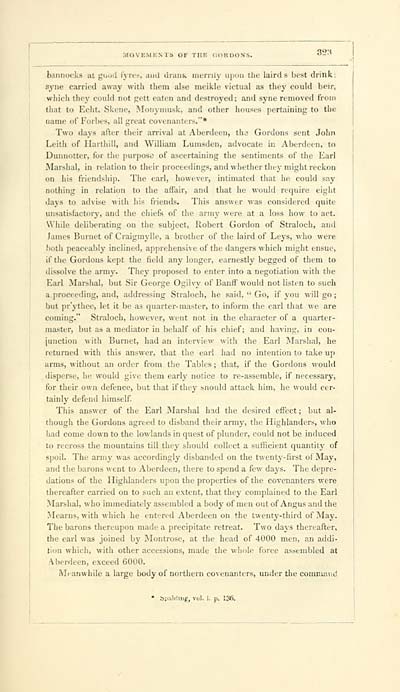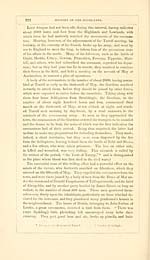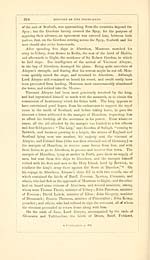Download files
Complete book:
Individual page:
Thumbnail gallery: Grid view | List view

MOVEMENTS OF TUB GORDONS.
3?H
bannocks at good iyrt's, aiiU dranh. merrily upon the lairds best drink;
syne carried away with them alse meilcle victual as they could beir,
which they could not gett eaten and destroyed; and syne removed from
that to Eeht, Skene, Monyniusk, and other houses pertaining to the
name of Forbes, all great covenanters."*
Two days after their arrival at Aberdeen, thj Gordons sent John
Leith of Haithill, and William Lunisdcn, advocate in Aberdeen, to
Dunnotter, for the purposo of ascertaining the sentiments of tlie Earl
Marshal, in relation to their proceedings, and whether they might reckon
on his friendship. The earl, however, intimated that he could say
nothing in relation to the affair, and that he would require eight
days to advise with his friends. This answer was considered quite
unsatisfactory, and the chiefs of the army were at a loss how to act.
While deliberating on the subject, Robert Gordon of Straloch, and
James Burnet of Craigmylle, a brother of tlie laird of Leys, who were
botli peaceably inclined, apprehensive of the dangers which might ensue,
if the Gordons kept the field any longer, earnestly begged of them to
dissolve the army. They proposed to enter into a negotiation with tlie
Earl Marshal, but Sir George Ogiivy of Banff would not listen to such
a. proceeding, and, addressing Straloch, he said, " Go, if you will go ;
but pr'ythee, let it be as quarter- master, to inform the earl that we are
coming." Straloch, however, went not in the character of a quarter-
master, but as a mediator in behalf of his chief; and having, in con-
junction with Burnet, had an interview with the Earl Marshal, he
returned with this answer, that the earl had no intention to take up
arms, without an order from the Tables ; that, if the Gordons woulil
disperse, !u» would give them early notice to re-asserable, if necessary,
for their own defence, but that if they snould attack him, he would cer-
tainly defend himself
This answer of the Earl Marshal hud tlie desired effect; but al-
though the Gordons agreed to disband their army, the Highlanders, who
had come down to the lowlands in quest of plunder, could not be induced
to recross the mountains till they should collect a sufficient quantity of
spoil. The army was accordingly disbanded on the twenty-first ofMay,
and the barons went to Aberdeen, there to spend a few days. The depre-
dations of the Highlanders upon the properties of the covenanters were
(hereafter carried on to such an extent, that they complained to the Earl
Marshal, who immediately assembled a body of men out of Angus and the
Mearns, with which he entered Aberdeen on the twenty-third of May.
The barons thereupon made a precipitate retreat. Two days thereafter,
the earl was joined by Montrose, at the head of 4000 men, an addi-
tion which, with other accessions, made the wliole force assembled at
Aberdeen, exceed 6000.
Meanwhile a large body of northern covenanters, under the comniiiuij
• Jsi'iilduig, vol. i. p. 136.
3?H
bannocks at good iyrt's, aiiU dranh. merrily upon the lairds best drink;
syne carried away with them alse meilcle victual as they could beir,
which they could not gett eaten and destroyed; and syne removed from
that to Eeht, Skene, Monyniusk, and other houses pertaining to the
name of Forbes, all great covenanters."*
Two days after their arrival at Aberdeen, thj Gordons sent John
Leith of Haithill, and William Lunisdcn, advocate in Aberdeen, to
Dunnotter, for the purposo of ascertaining the sentiments of tlie Earl
Marshal, in relation to their proceedings, and whether they might reckon
on his friendship. The earl, however, intimated that he could say
nothing in relation to the affair, and that he would require eight
days to advise with his friends. This answer was considered quite
unsatisfactory, and the chiefs of the army were at a loss how to act.
While deliberating on the subject, Robert Gordon of Straloch, and
James Burnet of Craigmylle, a brother of tlie laird of Leys, who were
botli peaceably inclined, apprehensive of the dangers which might ensue,
if the Gordons kept the field any longer, earnestly begged of them to
dissolve the army. They proposed to enter into a negotiation with tlie
Earl Marshal, but Sir George Ogiivy of Banff would not listen to such
a. proceeding, and, addressing Straloch, he said, " Go, if you will go ;
but pr'ythee, let it be as quarter- master, to inform the earl that we are
coming." Straloch, however, went not in the character of a quarter-
master, but as a mediator in behalf of his chief; and having, in con-
junction with Burnet, had an interview with the Earl Marshal, he
returned with this answer, that the earl had no intention to take up
arms, without an order from the Tables ; that, if the Gordons woulil
disperse, !u» would give them early notice to re-asserable, if necessary,
for their own defence, but that if they snould attack him, he would cer-
tainly defend himself
This answer of the Earl Marshal hud tlie desired effect; but al-
though the Gordons agreed to disband their army, the Highlanders, who
had come down to the lowlands in quest of plunder, could not be induced
to recross the mountains till they should collect a sufficient quantity of
spoil. The army was accordingly disbanded on the twenty-first ofMay,
and the barons went to Aberdeen, there to spend a few days. The depre-
dations of the Highlanders upon the properties of the covenanters were
(hereafter carried on to such an extent, that they complained to the Earl
Marshal, who immediately assembled a body of men out of Angus and the
Mearns, with which he entered Aberdeen on the twenty-third of May.
The barons thereupon made a precipitate retreat. Two days thereafter,
the earl was joined by Montrose, at the head of 4000 men, an addi-
tion which, with other accessions, made the wliole force assembled at
Aberdeen, exceed 6000.
Meanwhile a large body of northern covenanters, under the comniiiuij
• Jsi'iilduig, vol. i. p. 136.
Set display mode to: Large image | Transcription
Images and transcriptions on this page, including medium image downloads, may be used under the Creative Commons Attribution 4.0 International Licence unless otherwise stated. ![]()
| Early Gaelic Book Collections > Ossian Collection > History of the Highlands and of the Highland clans > Volume 1 > (437) |
|---|
| Permanent URL | https://digital.nls.uk/79677841 |
|---|
| Description | Vol. I. |
|---|---|
| Shelfmark | Oss.247 |
| Additional NLS resources: | |
| Attribution and copyright: |
|
| Description | Selected books from the Ossian Collection of 327 volumes, originally assembled by J. Norman Methven of Perth. Different editions and translations of James MacPherson's epic poem 'Ossian', some with a map of the 'Kingdom of Connor'. Also secondary material relating to Ossianic poetry and the Ossian controversy. |
|---|
| Description | Selected items from five 'Special and Named Printed Collections'. Includes books in Gaelic and other Celtic languages, works about the Gaels, their languages, literature, culture and history. |
|---|

